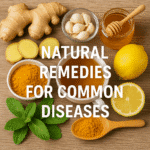Effective, Safe, and Science-Backed Relief Methods for Everyday Headaches
Headaches are one of the most common health complaints globally, affecting millions of people daily. Whether it’s a dull ache, throbbing pain, or tension across the forehead, a headache can disrupt your day and impact productivity. While over-the-counter medications like paracetamol or ibuprofen may provide quick relief, many people are turning to natural remedies for safer, long-term management.
Types of Headaches You Can Treat Naturally
Before jumping into the remedies, it’s important to identify the type of headache you’re experiencing:
-
Tension headaches – Usually caused by stress or muscle strain
-
Migraine headaches – Often severe, with nausea or sensitivity to light/sound
-
Cluster headaches – Intense pain around one eye, occurring in cycles
-
Sinus headaches – Due to congestion and sinus infection
Natural treatments are especially effective for tension, migraine, and sinus headaches.
1. Hydration: The First Line of Defense
One of the most common causes of headaches is dehydration. When your body lacks water, your brain can temporarily shrink from fluid loss, causing pain.
Remedy:
-
Drink 8–10 glasses of water daily.
-
Add electrolyte-rich drinks like coconut water if you’re sweating a lot or exercising.
-
Avoid sugary sodas or caffeine-heavy energy drinks that may dehydrate further.
2. Peppermint Essential Oil
Peppermint oil has a natural cooling effect that helps increase blood flow and reduce muscle contractions in the head.
How to Use:
-
Dilute 1–2 drops of peppermint essential oil with a carrier oil (like coconut or almond oil).
-
Massage onto your temples, forehead, and neck.
-
Breathe deeply for aromatherapy benefits.
Scientific Support: A study published in Cephalalgia showed that peppermint oil was as effective as acetaminophen for tension headaches.
3. Ginger Tea: Nature’s Anti-Inflammatory
Ginger is a potent anti-inflammatory and pain reliever, often compared to NSAIDs for its natural healing properties.
How to Use:
-
Grate 1-inch fresh ginger root into hot water.
-
Let it steep for 10 minutes, strain, and sip.
-
Add lemon or honey for flavor.
Bonus Tip: Ginger also helps reduce nausea, a common symptom of migraines.
4. Magnesium-Rich Foods
Magnesium deficiency is strongly linked to migraine headaches. Many people today are magnesium-deficient due to poor diets and stress.
Add to Your Diet:
-
Leafy greens (spinach, kale)
-
Nuts (almonds, cashews)
-
Seeds (pumpkin, flax)
-
Bananas
-
Dark chocolate (in moderation)
Supplement Tip: If you’re prone to migraines, a daily magnesium citrate supplement (300–400 mg) can help prevent attacks.
5. Cold or Warm Compress
The temperature you apply can significantly affect your pain.
-
Cold compress for migraines – Numbs the area and reduces inflammation.
-
Warm compress for tension headaches – Relaxes tight muscles in the neck and shoulders.
How to Use:
-
Apply for 15–20 minutes.
-
Lie down in a dark, quiet room for maximum benefit.
6. Aromatherapy with Lavender Oil
Lavender essential oil has been used for centuries to relieve anxiety, insomnia, and headaches.
How to Use:
-
Add a few drops to a diffuser and inhale.
-
Mix with carrier oil and massage gently into temples.
-
Add to a warm bath for full-body relaxation.
7. Caffeine: Use it Wisely
Caffeine can constrict blood vessels and offer quick relief, but too much can cause withdrawal headaches.
Tips:
-
A small cup of coffee or green tea at the onset of a headache may help.
-
Avoid daily overuse (limit to 1–2 small cups/day).
-
Try white tea or matcha as gentler options.
8. Stretching and Yoga
Physical tension in the neck, back, and shoulders is a major cause of headaches. Gentle stretching or yoga improves circulation and relieves tension.
Best Poses:
-
Child’s Pose
-
Cat-Cow Stretch
-
Seated Forward Bend
-
Neck Rolls
Even 10 minutes of yoga or mindful breathing can make a difference.
9. Acupressure Points
Acupressure stimulates specific points on the body to release blocked energy and improve pain.
Try This:
-
LI-4 (He Gu) point: Located in the web between your thumb and index finger.
-
Apply firm pressure for 30 seconds on both hands.
-
Repeat as needed.
10. Sleep and Lifestyle Balance
Poor sleep, irregular routines, and excessive screen time all contribute to frequent headaches.
Lifestyle Tips:
-
Aim for 7–8 hours of quality sleep.
-
Maintain a regular meal and hydration schedule.
-
Limit screen time, especially before bed.
-
Practice stress reduction techniques like journaling, mindfulness, or walking in nature.
When to Seek Medical Help
While natural remedies are powerful, they’re not always enough. Consult a healthcare professional if:
-
Your headache is sudden and severe.
-
You experience confusion, vision problems, or slurred speech.
-
Headaches persist for more than a few days despite treatment.
Final Thoughts
Headaches are a common health issue that can be effectively managed with natural remedies when approached correctly. This article explored science-backed solutions like hydration, essential oils, ginger tea, magnesium-rich foods, cold and warm compresses, and more. We also discussed lifestyle changes, including better sleep, yoga, and stress reduction, that play a vital role in preventing recurring headaches. Remedies like peppermint oil, lavender aromatherapy, and acupressure offer quick and natural relief without the risks of over-the-counter medications. While these methods are generally safe and beneficial, it’s important to monitor your symptoms and seek medical advice for persistent or severe headaches. By adopting these holistic practices into your daily routine, you can reduce headache frequency and enjoy better overall health and wellness.



